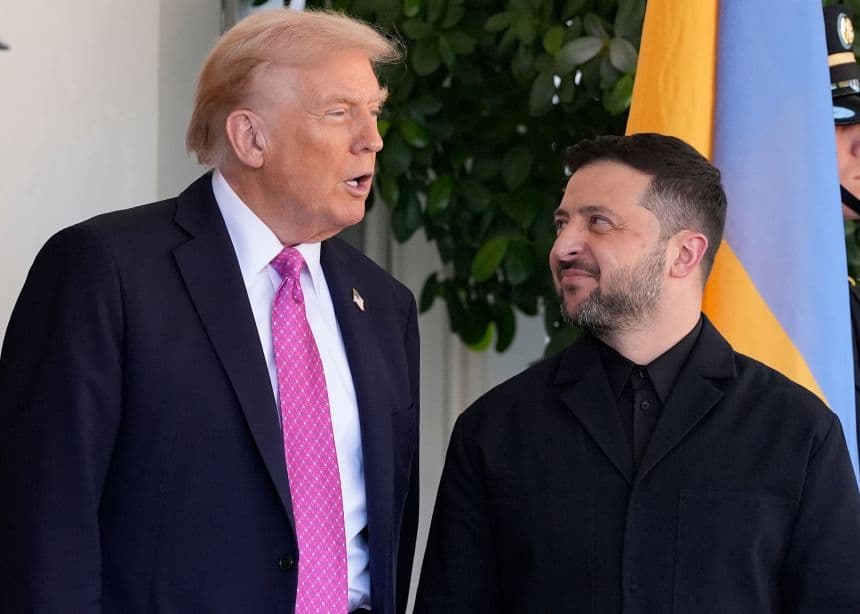We're loading the full news article for you. This includes the article content, images, author information, and related articles.
Former US President Donald Trump expressed reservations about supplying Ukraine with Tomahawk missiles, prioritising a swift end to the conflict while Ukrainian President Volodymyr Zelenskyy reiterated calls for robust security guarantees.

Former US President Donald Trump on Thursday, October 16, 2025, indicated hesitation in providing Ukraine with Tomahawk missiles, stating his focus is on concluding the ongoing conflict. Speaking to reporters ahead of a bilateral lunch with Ukrainian President Volodymyr Zelenskyy, Trump remarked, “One of the reasons we want to get this war over is…that it’s not easy for us to give you…massive numbers of very powerful weapons… Hopefully they won’t need it. Hopefully we’ll be able to get the war over with without thinking about Tomahawks.”
President Zelenskyy, during the same briefing, underscored the critical importance of NATO membership and strong security guarantees as integral components of any prospective peace agreement with Russia. He stated, “First of all, I think we need to sit and speak. The second point, we need ceasefire… We are ready to speak in any kind of format,” adding, “Nato, for Ukrainians, is very important… But the most important thing…for people in Ukraine, which are under each day’s attacks, to have really strong security guarantees.”
The discussion around military aid and peace negotiations comes amidst a protracted conflict in Ukraine, which has seen significant international involvement and humanitarian impact. Kenya, while geographically distant, has consistently advocated for peaceful resolutions to global conflicts through multilateral platforms, aligning with its foreign policy principles of non-alignment and diplomatic engagement. The East African nation has often emphasised the importance of international law and the sovereignty of states in its pronouncements on global affairs.
Trump positioned himself as a potential mediator, claiming a track record of resolving eight conflicts, including in the Middle East. “This is number nine. Okay, this will be number nine for me. I’ve solved eight, including the Middle East… I didn’t get a Nobel Prize…so I don’t care about all that stuff. I just care about saving lives. But this will be number nine,” he asserted. President Zelenskyy expressed optimism regarding Trump's potential role, stating, “President Trump really showed for the world that he can manage [a] ceasefire in [the] Middle East and that’s why I hope that he will do this and we will have a big success for Ukraine… I hope that President Trump can manage it.” Trump also noted the significant animosity between Zelenskyy and Russian President Vladimir Putin, suggesting a need for a mediated approach.
The specifics of any potential peace plan proposed by former President Trump remain largely undisclosed. Similarly, the exact nature of the “open channel of communication” between Melania Trump and President Putin regarding the return of displaced children, and the number of children involved, have not been fully clarified. The feasibility and terms of a ceasefire, as well as the scope of security guarantees acceptable to all parties, represent significant areas of ongoing uncertainty.
Observers will be closely monitoring any further developments from discussions between former President Trump and President Zelenskyy, particularly regarding the potential for a US-led mediation effort. The international community, including Kenya, will also be keen to see if concrete proposals for a ceasefire and long-term security arrangements emerge from these high-level engagements. The role of other international actors and organisations in facilitating peace will also be a key area to watch.
Keep the conversation in one place—threads here stay linked to the story and in the forums.
Sign in to start a discussion
Start a conversation about this story and keep it linked here.
Other hot threads
E-sports and Gaming Community in Kenya
Active 9 months ago
The Role of Technology in Modern Agriculture (AgriTech)
Active 9 months ago
Popular Recreational Activities Across Counties
Active 9 months ago
Investing in Youth Sports Development Programs
Active 9 months ago